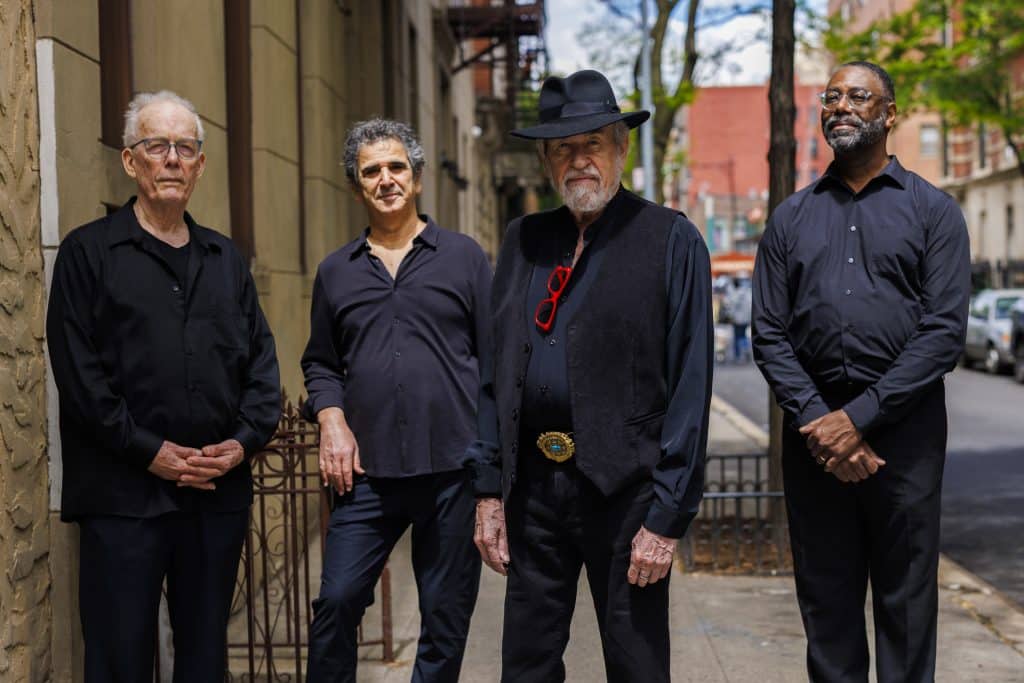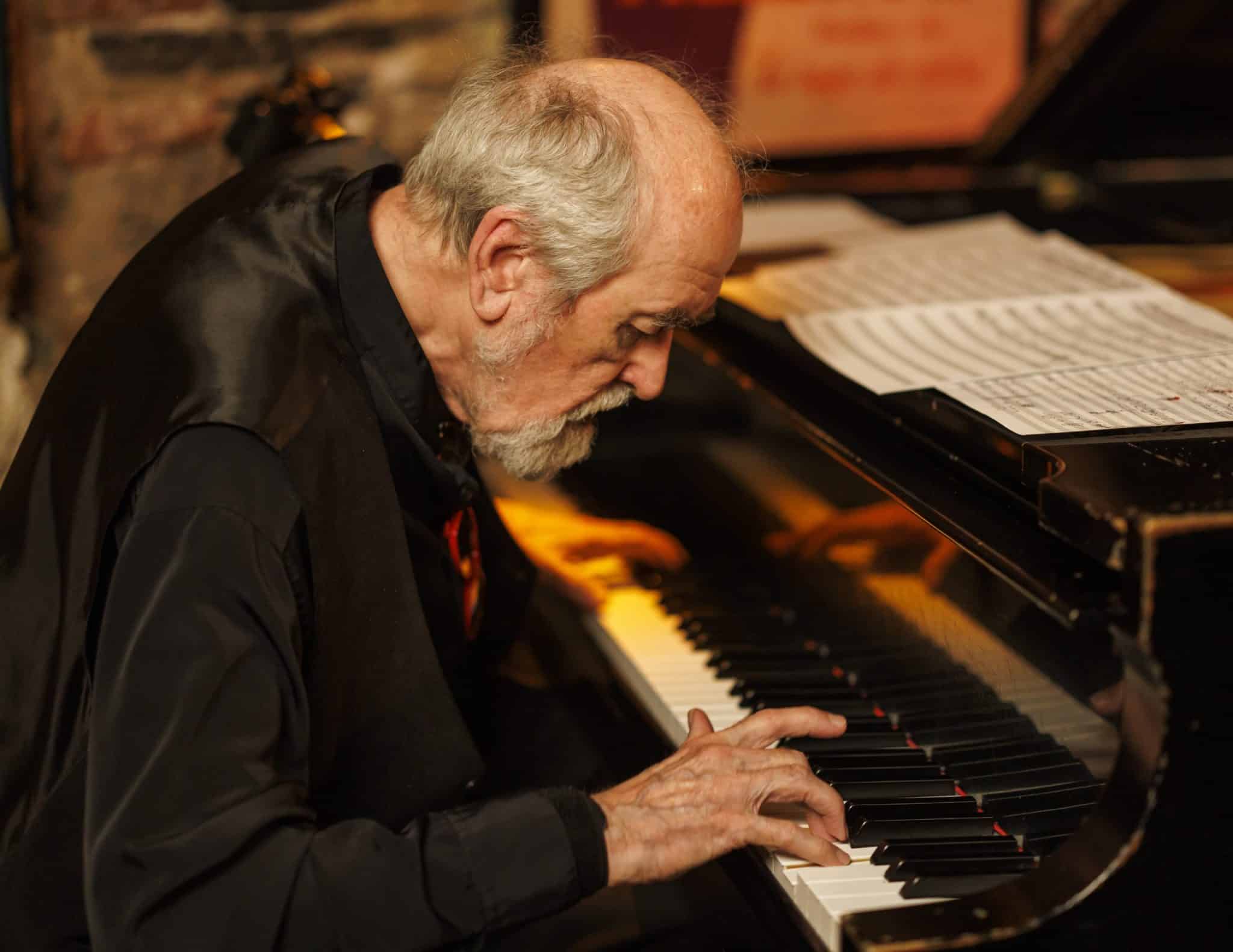The following is an interview between jazz journalist Morgan Enos and pianist/composer/arranger Roger Kellaway. His new album, Roger Kellaway Live at Mezzrow, arrived 17 May 2024 via Cellar Music Group in collaboration with the SmallsLIVE Foundation. It captures a performance at said New York City club with bassist Jay Leonhart and drummer Dennis Mackrel, with Roni Ben-Hur appearing as a guest guitarist.
Links to purchase Live at Mezzrow, and to Kellaway’s website, can be found at the bottom of this article.
For Roger Kellaway, the West Village jazz mainstay Mezzrow feels like home. Perhaps because it “harkens back to the ‘50s and ‘60s,” in his words, and the ‘60s are when Kellaway got his start.
As the veteran pianist and composer goes on to explain, he cut his teeth in clubs like the Half Note. These experiences armed him for Roger Kellaway Live at Mezzrow, his newest recording, captured at said club.
The CD captures his trio, which involves Jay Leonhart on bass and Dennis Mackrel on drums, with guitarist Roni Ben-Hur spicing up the proceedings. It’s mostly standards by Miles Davis and Ettore Stratta, and a Kellaway original, “All My Life,” closes out the program.
Read on for an interview with Kellaway about how Live at Mezzrow came to be.
UK Jazz News: What’s your history with Spike Wilner, Smalls and Mezzrow?
Roger Kellaway: I’ve played Mezzrow several times over the years. Frankly, I’ve never had too much of a relationship with Spike; he kind of hides out somewhere. It’s not a very huge club. When the club fills up, it’s all waitresses can do to maneuver between the tables.
But I’ve always loved the club, because it’s in the Village, and it kind of harkens back to the ‘50s and ‘60s.
My producer, Pat Philips, who’s known Spike for years and years, called Spike and recommended me to the SmallsLIVE Living Masters Award — and they said yes.
So, that’s how we got here, and that’s how the CD got made. We played two days in the club, and then we made the CD.
UKJN: Your career stretches back so far. What do you remember about the club scene back in the ‘60s?
RK: In the early ‘60s, I was spending most of my time at the Half Note, because that’s where I was playing with Clark Terry and Bob Brookmeyer, in their quintet, for two and a half years. I also did some work there with Zoot Sims and Al Cohn.
That was many years. And then I did a few years, in the spring, two pianos with Dick Hyman at a place called Michael’s Pub, which was on the east side. Dick’s always been my favourite two-piano partner.
UKJN: How did the band on Live at Mezzrow come to be?
RK: My relationship with [bassist] Jay Leonhart must be at least for two years. We’ve done so many recordings together, and he’s been one of my favourite bass players for ages and ages and ages. So, I started with him.
Dennis Mackrel is somebody who has not been part of my trio, but I’ve respected for a lot of years, so I decided to hire him. In fact, this was the first time in 20 years that I’ve, on my own gig, used piano, bass, drums, because my trio has been more like an Oscar Peterson trio: piano, bass, guitar.
Which brings up [guest guitarist] Roni. We’re five years into a relationship, and we’ve played a lot of gigs together. Originally, he was part of my New York trio, so we decided to Bring Roni onto this CD as a guest.

UKJN: I love your opening solo rendition of “Try to Remember.” What can you tell me about that?
RK: I first recorded that in 1986, in Japan. It became an improvisation bitonally, basically, with the left hand being an E flat major on the melody, and a G major right hand.
That’s an idea I’ve always kept, in terms of performing that piece, so I kept that again in this particular arrangement. For the last couple of years, I’ve used that to open almost every set that I do. The bitonality aspect of it sort of creates another world.
UKJN: After hearing their original recordings a million times, I appreciate that your Miles renditions sound fresh and personal and new.
RK: Those tunes are from 1958, and I’ve loved them all my life. In 1958, I was 18. I thought that I should do several of them, because I liked them as vehicles. “So What,” of course, and “All Blues,” but “Blue in Green” is a lot of fun. They’re all fun.
UKJN: Smack in the middle, we’ve got “Pages of Life” and “Good Morning Bahia.”
RK: Those pieces were written by Ettore Stratta. He was my producer [Pat Philips]’ late husband. Ettore was a formidable producer, particularly at Columbia Records. He did two Streisand albums; he was also the conductor for Michel Legrand for 20 years. Pat suggested that I look at some of his tunes, and maybe pick a couple.
With “Pages of Life,” I tried to create an homage to Ahmad Jamal’s “Poinciana,” which was a big hit for him many, many, many years ago. “Good Morning Bahia,” I thought would be a good vehicle for the group, including Roni. I like the energy of the tune.
UKJN: What does Ahmad Jamal mean to you?
RK: He was a piano player I listened to and had great respect for. But since I’m not really a person who listens to piano players very much, I didn’t listen a lot.
When I was about 20 years old, I decided that I didn’t want to listen to piano players anymore. I would listen to Miles and Sonny Rollins, and kind of get a feeling for horn players.
I remember Oscar Peterson, at one point, saying that one of the reasons that he often sings along with what he’s playing is because he wants his phrases to breathe. I found that fascinating.
Actually, I did my homage to Oscar [on 2006’s Heroes] when I had my older trio with [guitarist] Bruce Forman and [bassist] Dan Lutz. That was for IPO Records. I listened to Oscar Peterson for about a year and a half while we made that album; that’s the longest I’ve listened to a piano player in my entire life.
I’m much more in tune with listening to orchestration. That could be jazz, or it could be classical music – particularly 20th century classical music. Listening to orchestrations has something to teach me. I like studying.
UKJN: What are you listening to lately, in the orchestration department?
RK: I’ve been listening to Shostakovich’s first violin concerto. I really adore his compositions. I’m a huge fan of Leonard Bernstein’s compositions and orchestrations.
UKJN: “Take the A Train” – what a wonderfully classic way to send off the album.
RK: I always loved the tune. I never met Billy Strayhorn; I never met Ellington. Even though I did a concert with him in 1972 – and he had hand picked, I’d heard – my trio, which was Chuck Domanico on bass and John Guerin on drums.
He picked us to open for the band, but other than being on stage, he never came out of his dressing room, so I never got to meet him in time.
But “A Train” is a wonderful vehicle. I used to do a lot of gigs in New York with Joe Newman, a wonderful trumpet player. He was from the Basie band, and he loved doing “A Train” at a slower tempo, and that’s where I picked that up.
I think he played it slower than I played it on this CD. But the idea of it being at a slower tempo, and then doing all the tremolos for the entire chorus, have been part of how I’ve played that for maybe 10 or 15 years.
When you do anything at a slower tempo, you have more space to deal with. I like that. When you start with something that is so spatial, you have the rest of the technical things that you can do. There’s so much that you can build, in terms of a solo.


